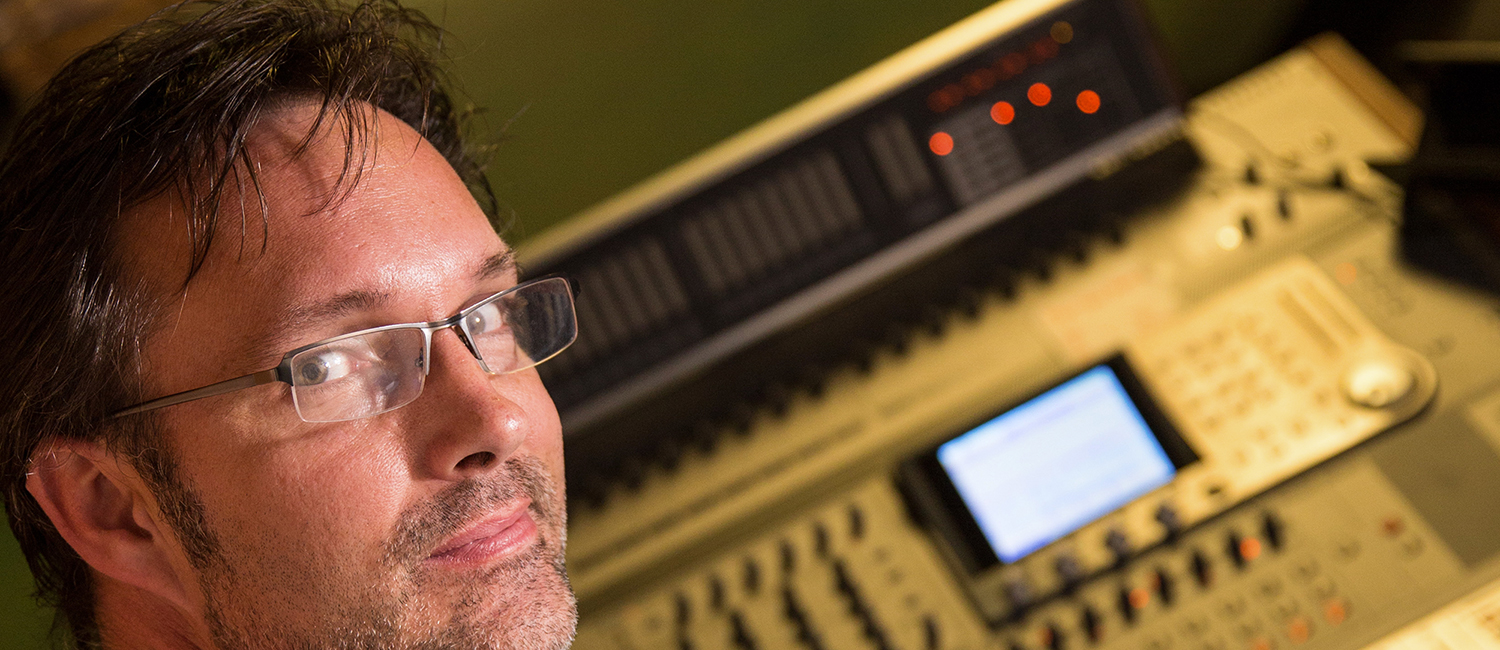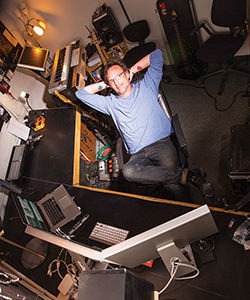
Theater prof makes FX available to all
Some people call Chris Guse the Theater Wizard. He prefers to think of himself as a storyteller.
“I use sound and technology to tell a story,” said Guse, who teaches in the Peck School of the Arts. “You go to a rock ’n’ roll concert to hear the music you love performed live. But there’s more to it – lighting, maybe a video presentation behind the band, prerecorded audio tracks. Designers and engineers who create that stuff are helping the band tell their stories. I do the same with plays.”

As the Theater Wizard, Guse has provided award-winning technical expertise for diverse arts groups, including the Milwaukee Chamber Theatre, the Atlanta Historical Museum in Atlanta, Texas, and the Zoological Society of Milwaukee’s Kohl’s Wild Theater. His work stands out, in part, because he has been able to provide high-tech effects even when smaller companies are on a shoestring budget.
Dave McLellan, theater coordinator for the zoo program, hired Guse to help develop “The Congo Code,” an original interactive play promoting conservation and STEM-based learning (science, technology, engineering and math) among area middle schoolers.
“Normally, the first thing you’d do with a project like this is hire someone to write the play before the designer is selected,” McLellan said. “Given what we wanted to do, we decided to hire a playwright and a tech designer to start the project at the same time.”
McLellan said Guse was as important as the playwright in telling the story. “That’s not typical in the theater world. When I hired him, I wasn’t sure what he’d do, but he figured it out.”
The 45-minute play took a year to develop. Guse provided video animation, original music and other technology integral to a plot designed to capture the hearts and minds of middle schoolers and teachers: Cameron, the protagonist, was trapped in a video game, and relied on the audience and their STEM skills to escape.
The play won the Milwaukee Business Journal’s 2015 Eureka Award for creativity, innovation and ingenuity in education, and Guse was invited to collaborate on another project.
Last fall, Kohl’s Wild Theater debuted “Trash or Tunes,” a collaboration between Guse and Alvaro Saar Rios, an assistant professor of playwriting in the Peck School.
“The theatrical style is more traditional, but we had to build musical instruments out of trash,” McLellan said.
Building the instruments was Guse’s task, and the wizard had many ideas. In the end, he focused on three: a pipe instrument, known as a plosive aerophone, that makes an unearthly sound; an electric guitar fashioned from a hand-held vacuum cleaner; and a drum kit made of buckets, springs, cans and a bike wheel.
Guse’s cost-conscious creativity has humble origins: his Sheboygan, Wisconsin, basement. His high-school rock band, Captain Crunch and the Funky Bunch, practiced there. A guitarist, Guse would pick up his bandmates’ instruments between practices – experimenting with musical arrangements and DIY technology.
“I kludged together a few cassette decks I had collected to create my own multitrack recording system,” said Guse, whose band broke up in the late ’80s. “It’s an early example of finding a low-cost solution to a high-end technical problem. I found out a couple years later that the joy I got from solving these kinds of problems was actually a skill coveted by the entertainment industry and particularly theater.”
Audiences can see his wizardry at work this spring, when the Peck School presents “Corktown.” The student production will feature animation, video and sound engineered by the Theater Wizard and his students.
___
Read the full 2016 UW-Milwaukee Research Report.